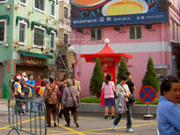Macao's public housing and direct payments to balance income gap

 0 Comment(s)
0 Comment(s) Print
Print E-mail CNTV, December 19, 2014
E-mail CNTV, December 19, 2014
Macao has the world's fourth highest GDP per capita, with its gaming industry now seven times larger than Las Vegas. But not everyone is getting rich at the same speed and scale. Over the past years, the region has tried to develop a strong social welfare system to bridge the gap.
A decent home is a basic necessity. But for Mr. Leung, a school bus driver in Macao and the only breadwinner in his family, it's only recently become a reality. After years on the waiting list, he and his family are overwhelmed to land a place in public housing. For them, it's a huge improvement from their previous home, which was no more than an iron shelter erected on the top of an old building.
"It was unbearably hot in the summer, and when typhoons came, we always feared that the shelter would be blown away. It also leaked a lot," says Leung's wife.
Although their new home in public housing is still cramped and far from downtown, the family is thankful that, with government funding, it costs just one-seventh the market price.
Over the past 15 years, Macao's housing prices have skyrocketed over ten times to around 130,000 RMB per square meter, or around 22,000 US dollars. But the average monthly income of the city is just around 12,000 RMB. This means that for an average Macao resident, after working for ten months, without spending anything, you could only afford an area of one square meter, the size of a manhole cover. Having affordable housing has become a dream for many Macao residents.
But not everyone is as lucky as Leung. At the moment, there are around 45,000 units available, still below the number of families in need.
"Construction is always delayed. Some of my friends have been approved and promised public housing for a long time, but their apartments are still under construction. The government is making a lot of money from the gaming industry. We don't understand why they are so ineffecient," says Coeng Manman, a Macao resident.
Macao boasts the largest gaming market in the world and collects a 30 percent tax from casinos. That money has gone to balancing the social income gap, including building more public housing and also handing out direct payments to residents. Locals call them "the red packets". Since 2008, Macao's government has given each permanent resident 5,000 Macao patacas, or 670 US dollars per year. That sum was increased over the years to 9,000 patacas in 2014, and will rise again to 10,000 patacas next year. But some officials question whether the current way of balancing the gap is the best way.
"The government continues to raise its investment in social welfare for ordinary people, but the income gap is still there if we only rely on gaming industry. Meanwhile, we have already seen a decline in the tax revenue from gaming over the past six months. That's also raised concerns over the sustainability of the current welfare system," says a man from Macao Social Security Fund.
For ordinary people like Leung, life is getting better. But they say what they really hope to see is a more diversified economy in Macao, in which people who are not in the gaming business can also have an equal chance to earn a decent income, without waiting for government help.






Go to Forum >>0 Comment(s)